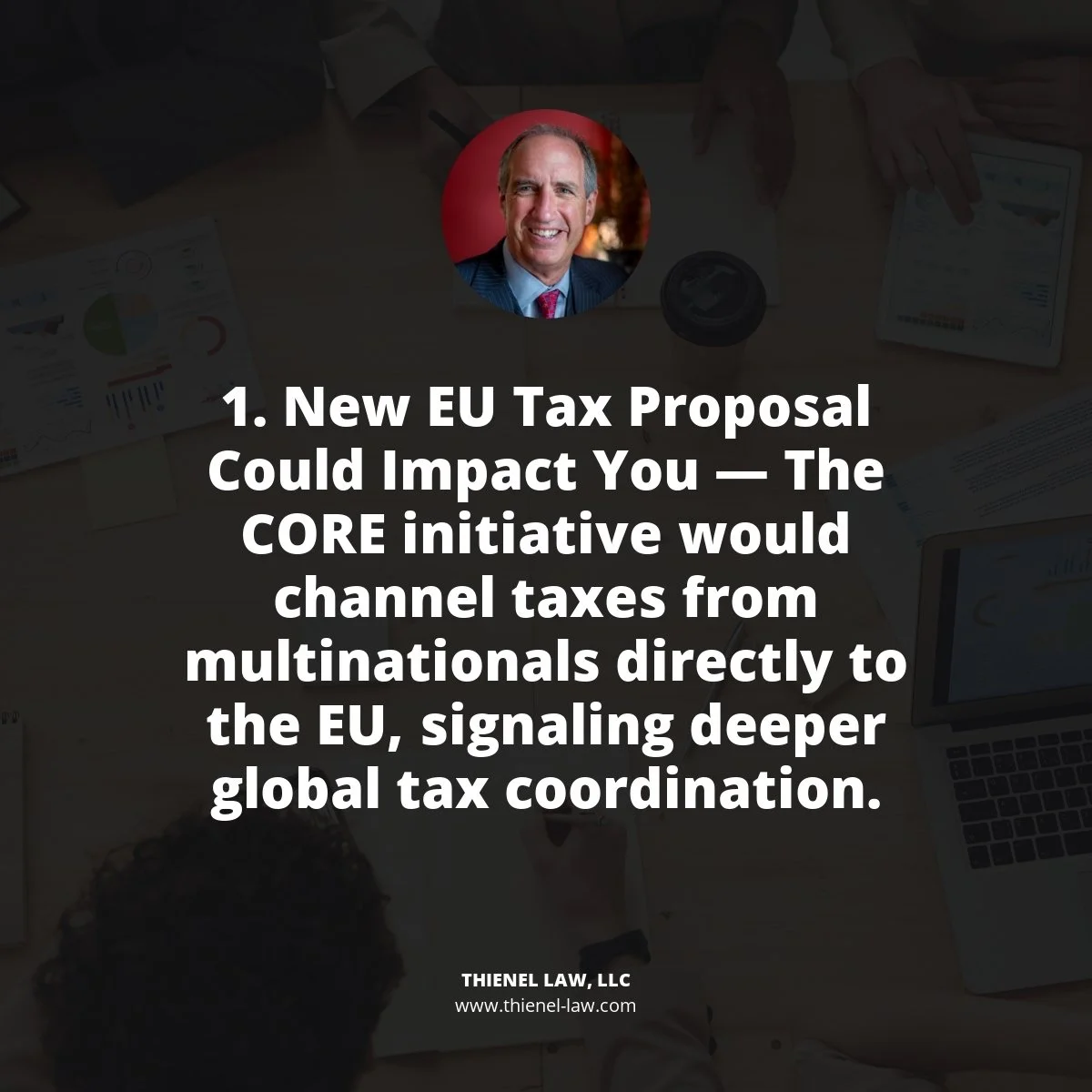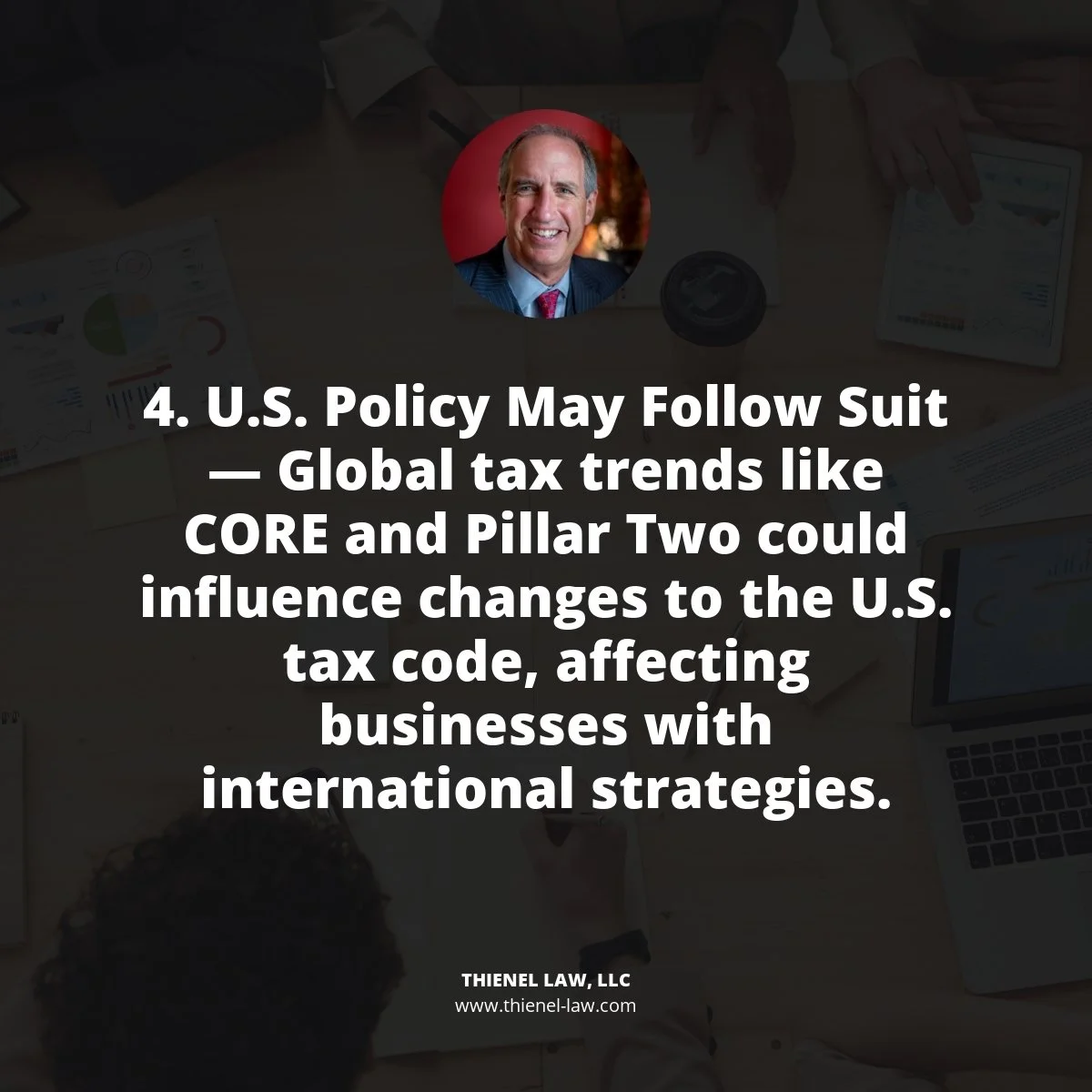Funding Europe’s Future: How the New CORE Proposal Could Reshape the EU Budget
Key Takeaways
The European Commission has proposed a new corporate taxation mechanism — the "Corporate Resource for Europe (CORE)" — as part of its 2028–2034 EU budget strategy.
CORE would collect annual fixed payments from multinational corporations with an annual net turnover of at least €100 million to fund EU-wide expenditures.
This proposal reflects a broader trend toward cross-border tax harmonization, which U.S. multinationals and globally-invested individuals need to monitor closely.
While CORE won't directly impact U.S. businesses operating only domestically, it offers important cues about future global tax cooperation and transparency standards.
DMV-based businesses and investors with EU ties should begin evaluating the long-term implications, including legal structure, income sourcing, and compliance risks.
What U.S. Business Owners Should Know About the EU's CORE Tax Proposal
The 2028–2034 EU budget cycle is shaping up to be more than just another bureaucratic update across the Atlantic. As part of the European Commission's new fiscal framework, a fresh revenue approach has been put on the table: the Corporate Resource for Europe, or CORE.
This proposal may seem distant or irrelevant for business owners and professionals in Maryland, Virginia, and D.C., at first glance. But CORE represents more than just a European revenue stream — it signals a shift in how international tax cooperation may evolve, with real-world implications for U.S.-based multinationals, investors with global portfolios, and high-earning individuals with cross-border interests.
At Thienel Law, we guide entrepreneurs, closely held companies, and high-net-worth individuals through the legal and tax strategies that protect what they've built. Understanding tax trends across jurisdictions — especially large markets like the EU — is no longer optional in today's interconnected economy.
Let's unpack what CORE is, why it matters, and what you should consider if you or your business have global exposure.
What Is the "Corporate Resource for Europe" (CORE)?
CORE is a proposal put forth by the European Commission as part of a broader effort to fund EU-level priorities between 2028 and 2034. Its goal is simple: develop new own-resources (revenue streams) for the EU budget that are stable, predictable, and fair.
CORE would capture a slice of the corporate income tax base from large multinational companies doing business in the EU, allocating a portion of that revenue directly to the EU rather than to individual countries. It is different from the OECD's "Pillar Two" initiative — which introduces a 15% global minimum corporate tax — and would piggyback on national-level implementation of these new rules. CORE and OECD would operate independently with different thresholds, calculation methods, and purposes.
The logic: if all EU member states must adopt Pillar Two minimum tax rules anyway, a coordinated EU-level revenue system can ride on top of that without creating extra compliance burdens or tax distortions. However, CORE is widely criticized as distortionary because it taxes turnover rather than profits, creating competitive disadvantages for low-margin businesses and imposing identical burdens regardless of profitability.
Instead, CORE is Europe's way of using a turnover-based levy to secure a cut of international corporate profits to help fund public goods like infrastructure, environmental programs, and social investments.
Why U.S. Business Owners Should Pay Attention
You may be wondering how a European tax proposal affects your Maryland-based LLC or your Virginia consulting firm. For purely domestic entities, CORE isn't likely to make a direct impact.
But the importance of developments like CORE lies in the signal it sends — and the trend it represents. Here's why DMV-area businesses, investors, and professionals should keep watching:
Cross-border compliance costs are rising because of tax harmonization.
U.S. multinationals operating in Europe may face dual-layer liability — with both nation-state taxes and EU-level obligations.
Tax transparency and reporting standards are expanding, requiring careful structuring.
Global minimum tax frameworks could influence how U.S. Congress adjusts domestic tax code to stay competitive and coordinated.
Estate planning strategies that include foreign investments must account for potential tax erosion.
Consider this: If you own a D.C.-based software company and have recently expanded into European markets, or if you have IP licensing income from UK, French, or German entities, CORE could eventually affect how and where your income is taxed.
In addition, family-owned businesses with European subsidiaries or real estate holdings abroad may face compliance touchpoints with CORE over the next decade.
Practical Implications for DMV Businesses and Investors
While CORE is in the proposal stage and would not take effect before 2028, it provides a valuable bellwether for future international tax coordination. Let's walk through a few concrete scenarios where core outlines from Europe could shape your planning agenda:
Multinational Corporations
A U.S.-incorporated C-Corp with operations in several EU countries may face a reduced pool of post-tax profits as CORE claims a portion of the tax base. Even if not double-taxed, the liability could shrink distributable earnings. CFOs will need to re-evaluate tax-efficient structuring options, transfer pricing policies, and local vs. EU disclosures.
LLCs and Partnerships with Foreign Investments
Pass-through structures that hold equity stakes in international ventures, common among tech startups and growth-stage investors in the DMV, need to watch for cascading tax treatment. CORE could affect withholding rates, reporting requirements, or eligibility for foreign tax credits.
Foreign-Owned U.S. Subsidiaries
If you're working with inbound investors from Europe, they may face new budgetary pressures or tax offset strategies driven by CORE. Such shifts could influence capital inflows, partnership interest sales, or estate planning vehicles abroad.
High-Net-Worth Individuals with Cross-Border Portfolios
If your wealth includes assets in Europe (real estate, businesses, funds), future EU-level levies may reduce yields or trigger unexpected complexities. Planning for defensible residency status, tax treaty optimization, and income characterization gets more important.
Estate Planning with Foreign Components
More families are incorporating international trusts, dual citizenship, or foreign pensions into their wealth planning. CORE intensifies the need to evaluate income sourcing, tax-treaty protections, and disclosure obligations for fiduciaries or trustees.
CORE, OECD Pillar Two, and U.S. Policy Outlook
Perhaps most importantly, CORE doesn't exist in a vacuum.
It builds off ongoing global efforts to create a more coordinated global tax architecture, particularly the OECD's Pillar One and Pillar Two initiatives.
Pillar Two's framework sets a global minimum effective corporate tax rate of 15% for large multinational groups with €750 million+ in annual revenue. The U.S. has not adopted Pillar Two legislation yet but has signaled increasing engagement. CORE amplifies that initiative by routing part of that tax revenue up to the EU level rather than stopping at individual member states.
If that model works in practice, it's not hard to imagine regional tax blocs experimenting with similar resource-sharing methods. Future U.S. administrations might even revisit federal-state corporate tax interactions or adopt global minimum tax thresholds that pressure U.S.-based businesses.
For DMV executives with global ambitions, now's the time to plan. Not once the tax code changes but while you still have room to adapt.
Risk Management for Small and Mid-Sized Businesses
Even if your company is not directly taxed under CORE, broader tax compliance risks are rising.
Here are a few strategic recommendations we're discussing with clients in 2024 and 2025:
Perform a nexus review: If your business has international affiliates, vendors, or warehousing, revisit where you're subject to reporting versus taxation — the lines continue to blur.
Re-examine your legal structure: A single-member LLC might work domestically but lack the flexibility or liability shielding needed if you scale abroad.
Monitor foreign tax credits and reporting thresholds: U.S. filers must navigate an increasingly complex matrix of information returns, credit eligibility, and treaty overrides.
Align estate and gift planning with international tax thresholds: Familiar estate structures like ILITs or GRATs could yield surprises if paired with foreign assets or dual-resident heirs.
In other words, your domestic plan may no longer be enough if you're earning, investing, or growing globally.
Looking Ahead: Why Global Tax Strategy Matters More Than Ever
One proposal in a European budget plan may not seem urgent today. Yet it reflects an unmistakable trajectory. Governments are coordinating across borders to make tax enforcement more seamless, and businesses are being placed under increasing pressure to navigate overlapping systems cleanly.
For U.S. business owners who operate internationally, or who expect to diversify into global markets or portfolios, real strategy means looking beyond domestic IRS rules.
Thienel Law brings integrated guidance across business law, tax planning, trust structures, and compliance to protect what you're building — locally and globally.
Need Guidance on Cross-Border Tax and Structuring?
If you're unsure how CORE or other global tax trends could affect your business or financial goals, we're here to help.
Schedule a consultation with Steve Thienel to get tailored legal and tax advice built around your individual circumstances.
Contact Thienel Law for trusted counsel on business structuring, estate planning, and international strategy in Maryland, D.C., and Virginia.






